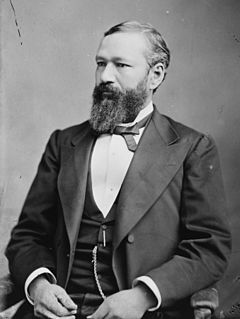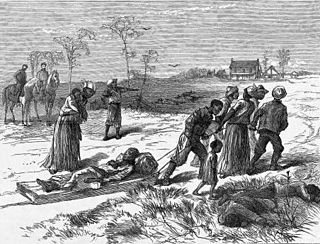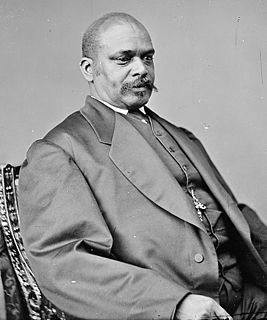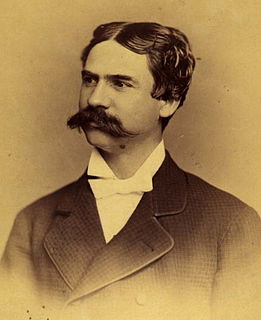
Pinckney Benton Stewart Pinchback was an American publisher and politician, a Union Army officer, and the first African American to become governor of a U.S. state. A Republican, Pinchback served as the 24th Governor of Louisiana from December 9, 1872, to January 13, 1873. He was one of the most prominent African-American officeholders during the Reconstruction Era.

The Colfax massacre, or Colfax riot as the events are termed on the 1950 state historic marker, occurred on Easter Sunday, April 13, 1873, in Colfax, Louisiana, the seat of Grant Parish, when approximately 150 black men were murdered by white Southerners.

Oscar James Dunn was one of three African Americans who served as a Republican Lieutenant Governor of Louisiana during the era of Reconstruction.

The New Orleans Massacre of 1866 occurred on July 30, during a violent conflict as white Democrats, including police and firemen, attacked Republicans, most of them black, parading outside the Mechanics Institute in New Orleans. It was the site of a reconvened Louisiana Constitutional Convention. The Republicans in Louisiana had called for the Convention, as they were angered by the legislature's enactment of the Black Codes and its refusal to give black men the vote. Democrats considered the reconvened convention to be illegal and were suspicious of Republican attempts to increase their political power in the state. The massacre "stemmed from deeply rooted political, social, and economic causes," and took place in part because of the battle "between two opposing factions for power and office." There were a total of 150 black casualties, including 44 killed. In addition, three white Republicans were killed, as was one white protester.

William Pitt Kellogg was an American lawyer and Republican Party politician who served as a United States Senator from 1868 to 1872 and from 1877 to 1883 and as the Governor of Louisiana from 1873 to 1877 during the Reconstruction Era.

John McEnery was a Louisiana Democratic politician and lawyer who was considered by Democrats to be the winner of the highly contested 1872 election for Governor of Louisiana. After extended controversy over election results, the Republican candidate William Pitt Kellogg was certified. McEnery, who had been an officer in the Confederate States Army during the American Civil War, was not allowed to take office following a weighing in by the federal government and local Republicans loyal to President Ulysses S. Grant.

Joshua Gabriel Baker was the 22nd Governor of Louisiana during Reconstruction.

Stephen Bennett Packard, a native of Maine, emerged as an important Republican politician in Louisiana during the era of Reconstruction. He was the unsuccessful Republican gubernatorial nominee in 1876.
William Jasper Blackburn was an American printer, publisher and politician who served in the United States House of Representatives from northwestern Louisiana from July 18, 1868, to March 3, 1869. A Republican during Reconstruction, he was elected to the Louisiana State Senate, serving from 1874 to 1878.

Since 1977 state elections in Louisiana have used a unique system similar to the majority-runoff system used in some other jurisdictions, which in Louisiana has become known as a “jungle” primary or an "open" primary, where all the candidates for an office run together in one election. If someone gets a majority, that individual wins outright; otherwise, the top two candidates, irrespective of partisan affiliation, meet in a runoff election. This primary system is used for state, parish, municipal, and Congressional races, but is not used for presidential elections.
The following table indicates the party of elected officials in the U.S. state of Louisiana:

The Battle of Liberty Place, or Battle of Canal Street, was an attempted insurrection by the Crescent City White League against the Reconstruction Era Louisiana state government on September 14, 1874, in New Orleans, which was the capital of Louisiana at the time. Five thousand members of the White League, a paramilitary organization of the Democratic Party, made up largely of Confederate veterans, fought against the outnumbered New Orleans Metropolitan Police and state militia. The insurgents held the statehouse, armory, and downtown for three days, retreating before arrival of Federal troops that restored the elected government. No insurgents were charged in the action. This was the last major event of violence stemming from the disputed 1872 gubernatorial election, after which Democrat John McEnery and Republican William Pitt Kellogg both claimed victory.

Jean Maximilien Alcibiades Derneville DeBlanc was a lawyer and state legislator in Louisiana. He served as a colonel for the Confederate army during the American Civil War. Afterward, he founded the Knights of the White Camellia, a white insurgent militia that operated from 1867-69 to suppress freedmen's voting, disrupt Republican Party political organizing and try to regain political control of the state government in the 1868 election. A Congressional investigation overturned 1868 election results in Louisiana.

The Louisiana gubernatorial election, 1872, was the second election to take place under the Louisiana Constitution of 1868. As a result of this election William Pitt Kellogg was elected Governor of Louisiana, but not before federal troops stepped in to enforce his election. The results of this election were highly contentious and resulted in racial violence across the state. U. S. President Ulysses S. Grant had to step in and formally recognize Kellogg as Governor to resolve the violence. Kellogg's Democratic opponent John McEnery finally conceded the election in September 1874 after briefly overthrowing Kellogg's government.

The Louisiana gubernatorial election, 1876, was the third and final election to take place under the Louisiana Constitution of 1868. As a result of this election Francis T. Nicholls became Governor of Louisiana, but not before the election was contested by his opponent. The results of this election, like those of 1872 were disputed. The dispute was resolved by the Compromise of 1877 which gave the Governor's Mansion to Democrat Francis T. Nicholls. The Compromise also gave Republican presidential candidate Rutherford B. Hayes the electoral votes of several disputed states, including Louisiana, which resulted in his election to the White House. The election of Nicholls marked the end of Reconstruction in Louisiana and the decline of the Republican Party of Louisiana.

The 1868 United States presidential election in Louisiana took place on November 3, 1868, as part of the 1868 United States presidential election. Voters chose seven representatives, or electors to the Electoral College, who voted for president and vice president.
Francis Ernest Dumas was a wealthy plantation owner and slaveholder of Louisiana. He was of African American and creole heritage and served as an officer in the Union Army during the American Civil War.

















